What Hi-Fi? Verdict
Despite its striking appearance and detailed sound, the Devialet Dione doesn’t deliver the features or immersive soundstage of the best
Pros
- +
Excellent clarity and lack of distortion
- +
Rhythmically responsive
- +
Clear, crisp dialogue
Cons
- -
Not the most immersive
- -
Expensive
- -
Dynamically restricted
Why you can trust What Hi-Fi?
Unlike traditional hi-fi and home cinema systems, where costs range from entry-level to the-sky's-the-limit, soundbars typically occupy a much narrower range of prices for obvious reasons. A soundbar is usually a trade-off for those who don’t have the space or funds for full-sized speakers or the patience for the paraphernalia that accompanies them. And why would anyone want a luxury version of a compromised product?
But with its first-ever Dolby Atmos soundbar, the Dione, premium French audio brand Devialet is striking out, elevating the form with a lavish design and high-minded concept that endeavours to convince customers that just because they want a simple, single TV speaker doesn’t mean that they can’t do so in style.
Build
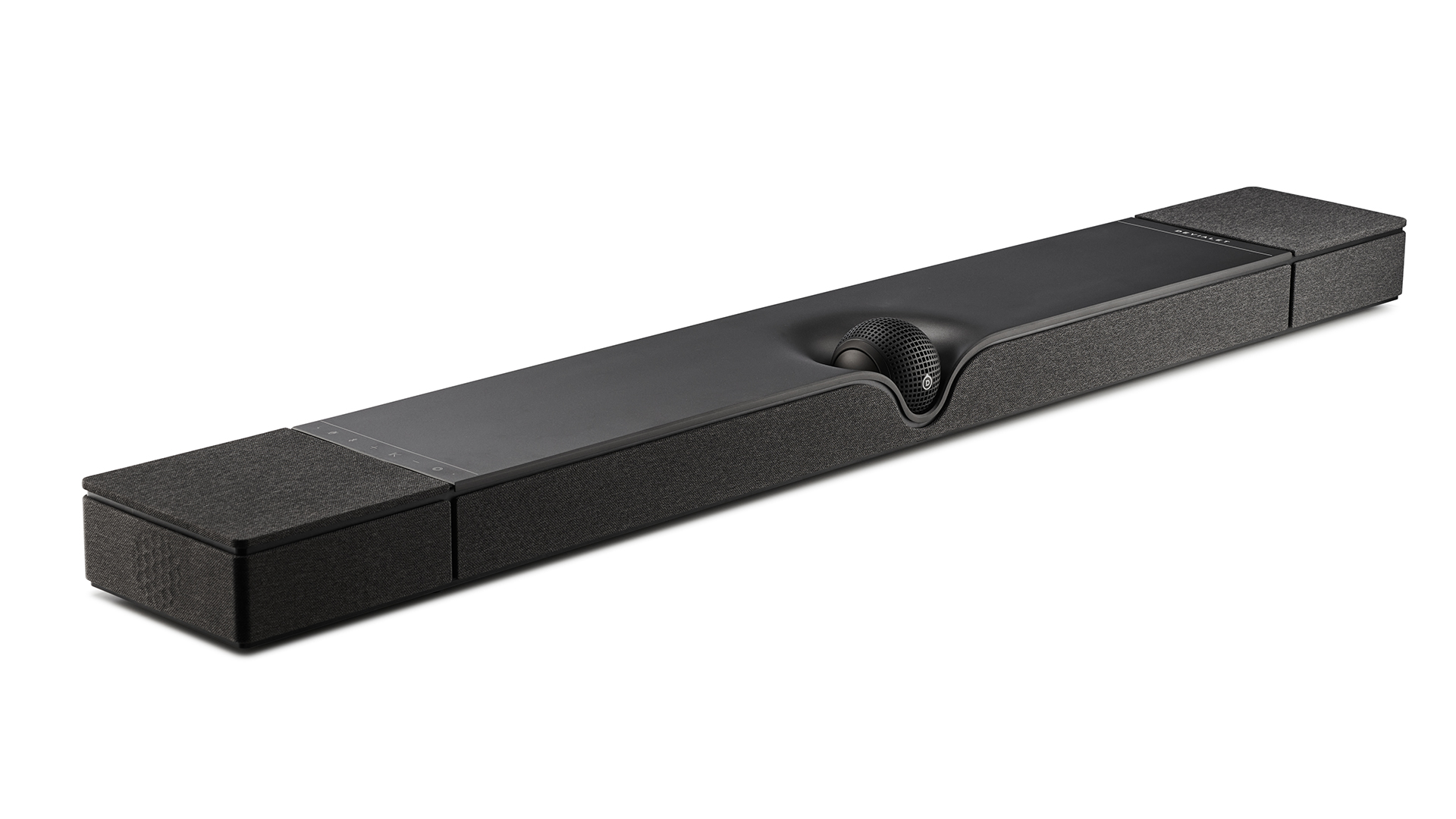
The Dione is a one-box Dolby Atmos soundbar with no options to add an external sub or rear speakers, instead relying on eight long-throw mid-woofers to deliver an impressively extended bass performance that reaches down to a claimed 24Hz, as well as two side-firing 41mm aluminium drivers for surround effects.
It’s not only internally where Devialet is doing things a bit differently. The Dione also has a distinct build quite unlike any soundbar we’ve ever seen before, primarily due to the presence of a separate, external 41mm aluminium drive unit in an orb that not only sits in a vortex-like trough in the centre of the speaker but can also manually rotate.
And why would you want to turn your new premium soundbar’s orb? Because the Dione is designed to operate in two orientations, horizontally on a flat surface or flipped around with its top panel facing outwards and hung on a wall. Hardware fixings are included in the box, as is a handy cardboard template.
At just 77mm tall (or deep in its wall positioning), the Dione is slim and smart with removable grey fabric grilles, capacitive playback controls, and a tactile anodised aluminium finish that slightly resembles the texture of a foot pumice. Unfortunately, the surface is easy to scuff, so we advise some restraint and care when touching the product, especially around the alluringly pivotable orb.
Features
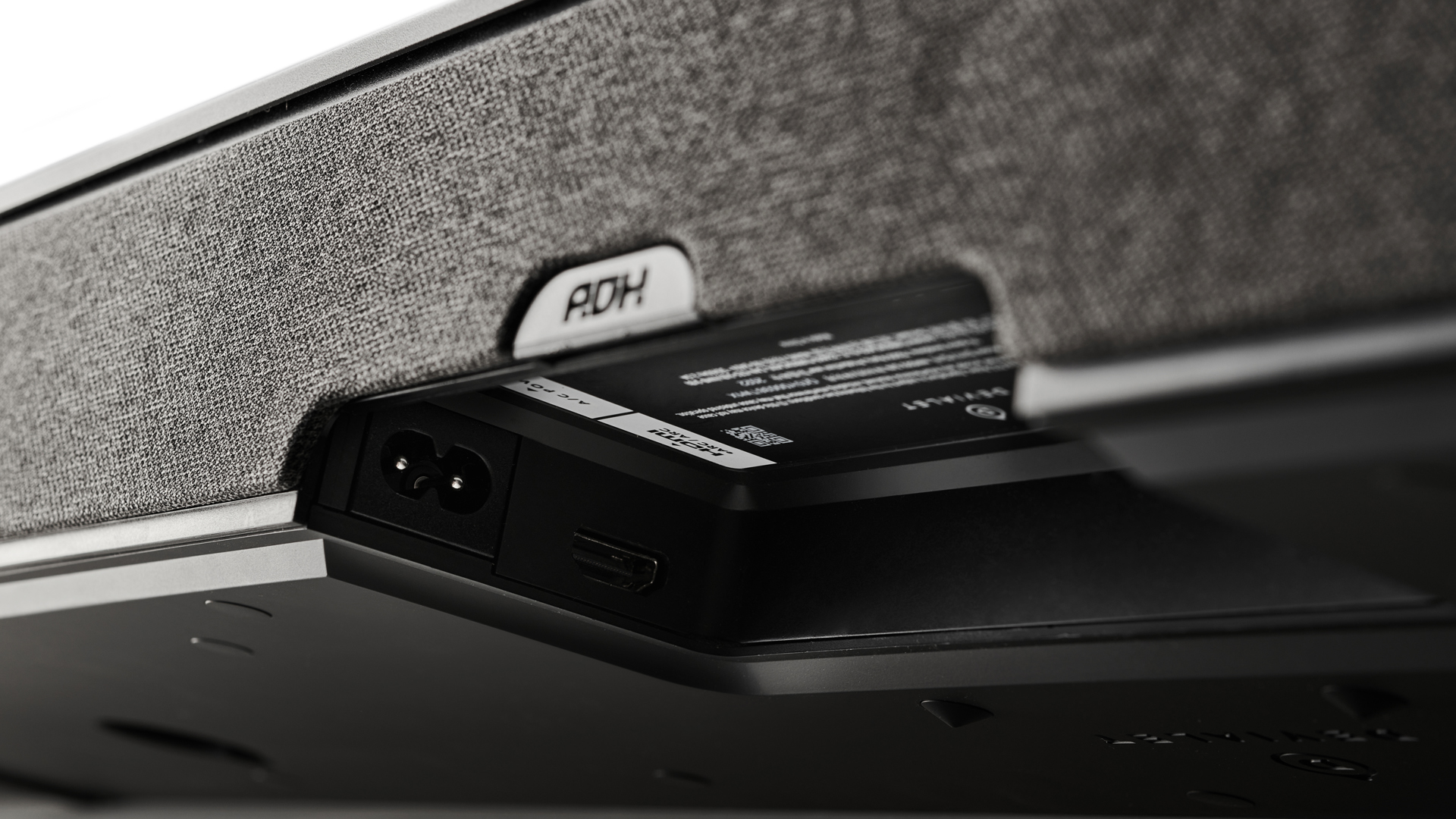
To mitigate your home’s acoustic abnormalities, there is an onboard room calibration function that uses the Dione’s four onboard microphones (their only use, as there is no in-built voice control) to measure the response of your room. Still, it's pretty rudimentary, and in our listening room did not yield a significant change.
Disappointingly there is no option to change the EQ or volumes of specific channels. So if you wish to tweak the sound further, the only alternative is modes for Movie, Music and Dialogue, as well as a Spatial option that uses Devialet’s SPACE processing to up-mix non-Atmos content and make use of all available channels. While we typically avoid upmixing, surprisingly, the Spatial setting yields a solid presentation that doesn’t significantly deviate or add much colour and clutter to the original audio.
Users can set a preference for which mode is used with each of the soundbar’s inputs. For such a high-end product, the Dione’s choice of sources is a little on the sparse side. Hardwired connections comprise a single eARC/ARC HDMI and an optical input in a recess at the rear alongside an ethernet port. And for streaming, there’s Bluetooth 5 and wi-fi for AirPlay 2, Spotify Connect and UPnP up to 24bit/96kHz.
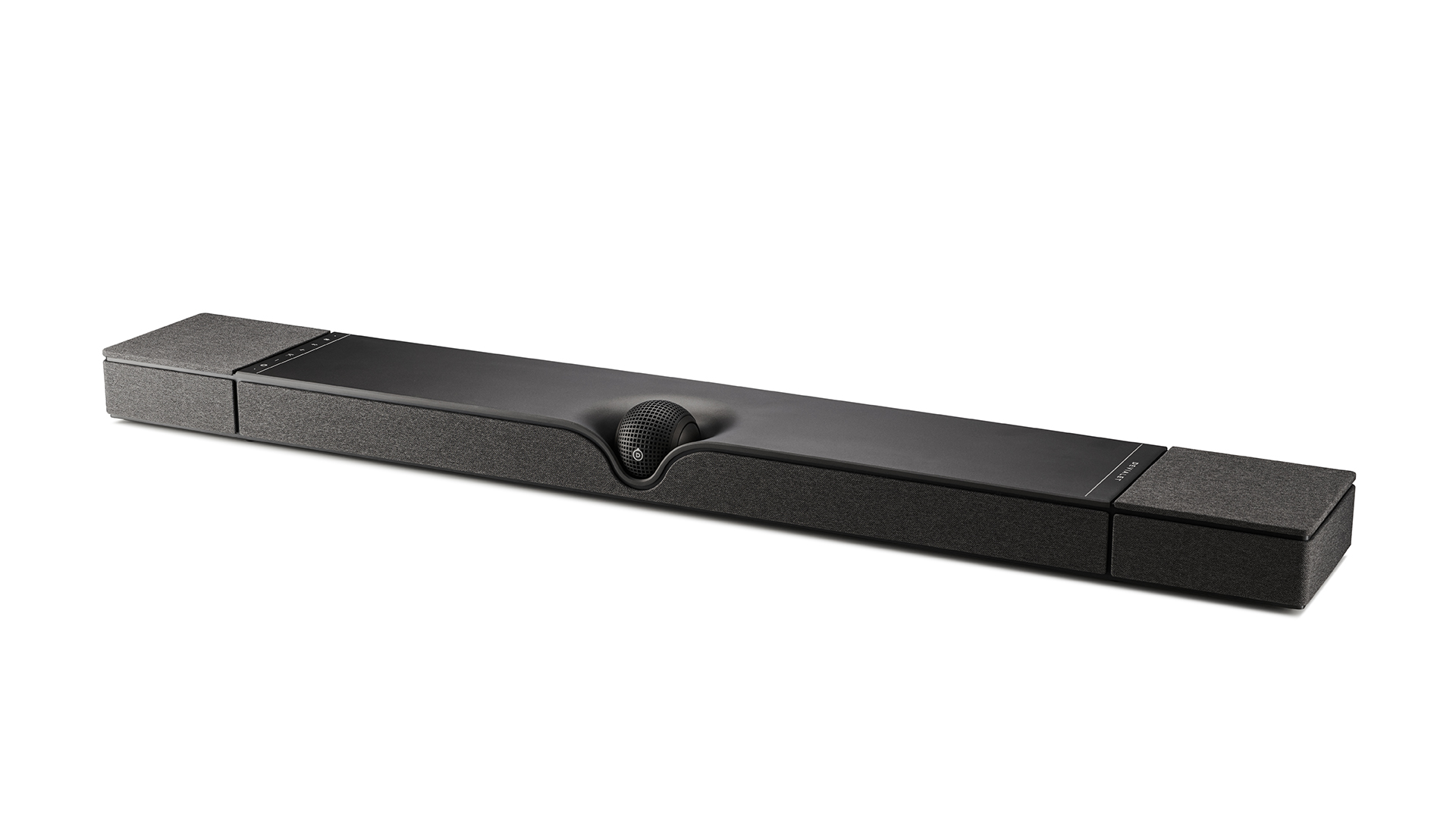
Connections 1 x eARC,1 x optical, ethernet
Sound formats LPCM, Dolby Digital, Dolby Digital Plus, Dolby TrueHD, Dolby Atmos
Bluetooth 5? Yes
Wi-fi? Yes, AirPlay, Spotify Connect
Dimensions (hwd) 7.6 x 88 x 12.8cm
Weight 3.6 kg
In its tabletop position, the Dione’s 134mm, high-excursion woofers sit four a-piece on its long edges, while four 41mm aluminium drivers face upwards to bounce vertical height effects off your ceiling. As well as the surround speakers, a pair of 41mm drivers sit on the front left and right, joining the centre orb driver that is also augmented with two passive radiators to help widen its dispersion.
In total, there are nine 41mm aluminium drivers, and depending on your chosen orientation, you will either have five or three facing you, while the eight woofers will either point front and back or upward and downwards. But whichever way you spin it (and the in-built gyroscope will let you know), it’s always a 5.1.2 Dolby Atmos configuration.
Unlike a few other multi-positional soundbars that we’ve heard before, the Dione doesn't perform significantly better in one position over another. However, the placement of its drivers does mean that users should take into account the distance from the rear wall (as this affects bass output), as well as the thickness and proximity of the TV screen (which has an impact on projection of height effects).
Price
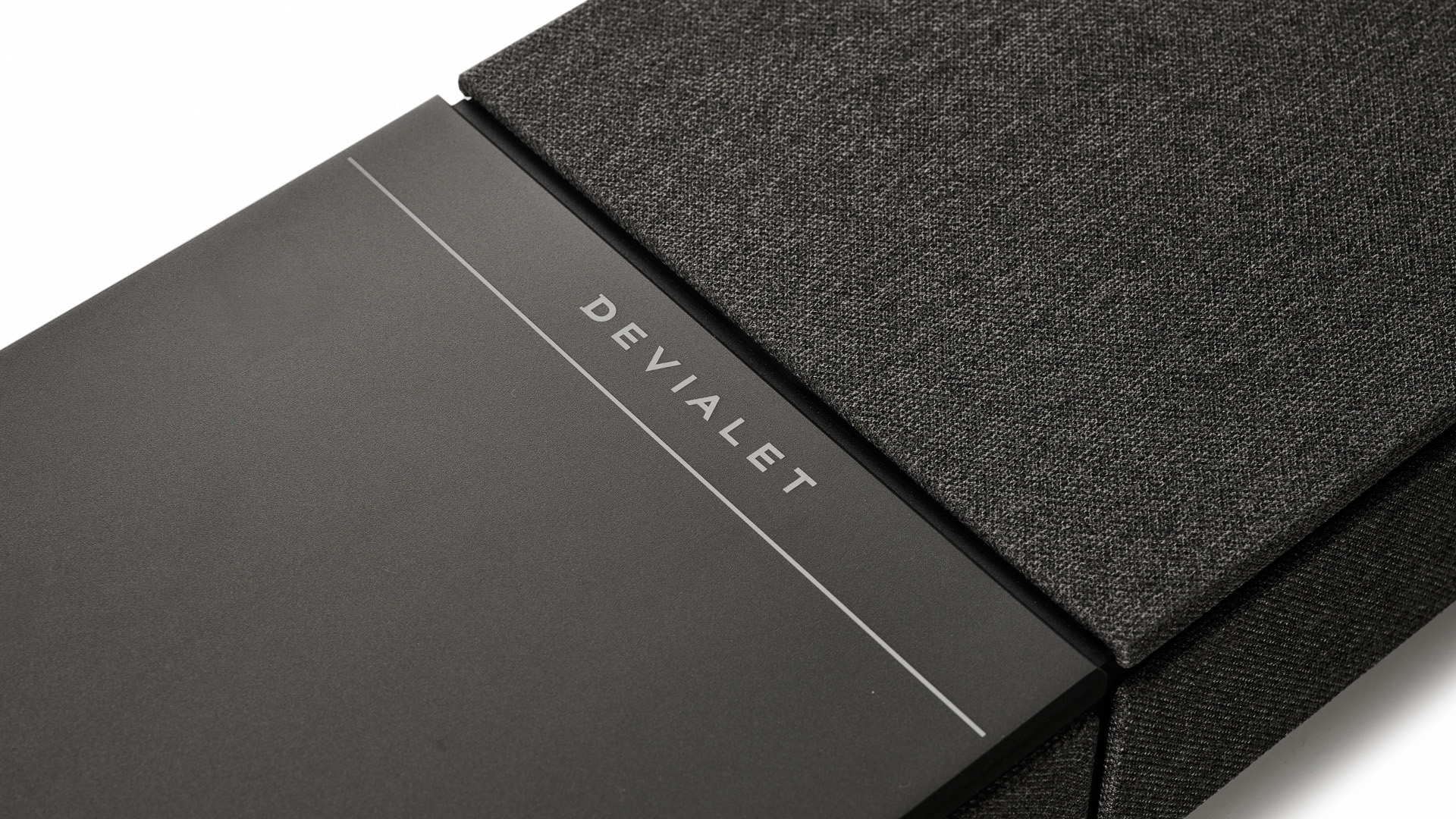
Priced at £1990 / $2399 / AU$3999, we can’t help but feel that the Dione is a little stingy with its feature set, especially compared with its only real competition at this end of the market, the single soundbar beast that is Sennheiser’s Ambeo.
The What Hi-Fi? Award-winning Ambeo has been around a few years longer than the Dione and can sometimes be found for up to 10 per cent less than its launch price of £2200 / $2500 / AU$4000. It is similarly a solo prospect (though there is an analogue output to add a sub) but offers many features that the Dione lacks, including Chromecast, Tidal Connect and three additional HDMI inputs.
Another critical difference between these two is that while the Ambeo includes support for Dolby Atmos alternative DTS:X, the Dione does not. For some Blu-ray fans, that will seem like a significant omission.
Confirmation of the type of decoded audio signal can be found on the Devialet app, along with playback and volume controls. The Dione doesn’t include a remote, but with HDMI-CEC, the expectation is that after set-up and sound mode allocation to each source, most users will use a TV remote for basic control.
What the Dione lacks in functionality, it perhaps tries to make up for in initialisms. Thanks to the inclusion of Devialet’s Intelligence Processor, the Dione also sports some of the technology found elsewhere in the company’s speaker range. This includes Analogue Digital Hybrid (ADH) amplification, which Devialet says merges digital and analogue amplification for a combination of power and precision, Speaker Active Matching technology (SAM) which prevents a driver from exceeding its limits by adjusting the output signal, and Adaptive Volume Level (AVL), a dynamic EQ designed to make sure no dialogue or small detail is missed.
Sound
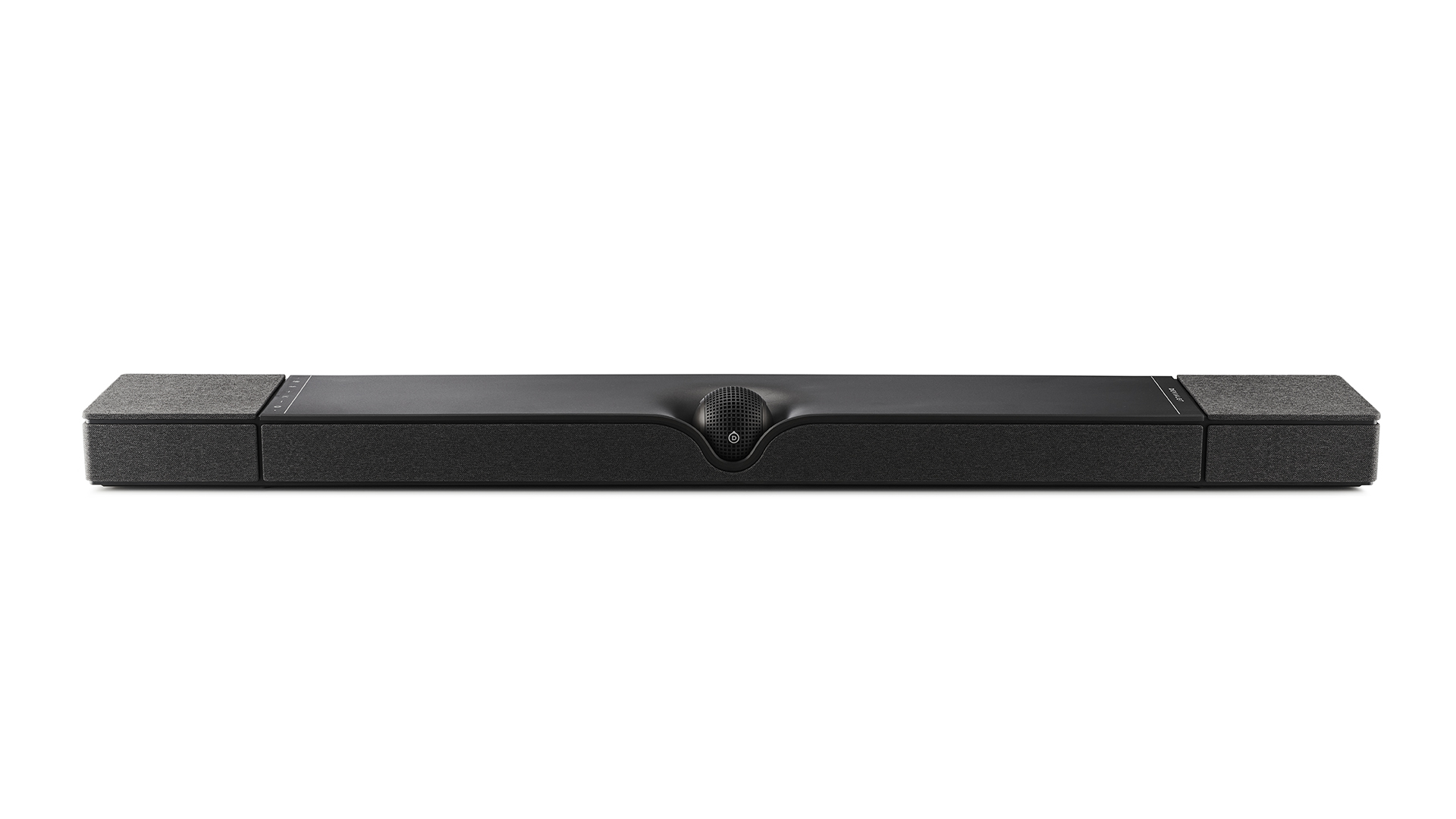
There’s plenty to enjoy about the way Devialet’s approach enhances the Dione’s performance as we start our testing with the opening of Gravity in Dolby Atmos. While the astronauts’ voices ping-pong across the soundfield, the Dione has a firm grip, with an authoritative presentation and consistent tonality. There’s none of that spatial with a capital ‘S’ processing that many manufacturers favour, which overly relies on fizzy high frequencies to create a sense of a 3D soundstage.
That said, while the Dione’s handling of Atmos is tasteful, as the ISS begins spinning in turmoil, the soundscape it produces is not particularly enveloping, with little forward, upward or sideward projection. Of course, a single soundbar reflecting sound off walls and ceilings will never be the same as direct surround sound, but the Sennheiser Ambeo is more convincing in this regard and better delivers on the promise of a true all-in-one system.
However, the Dione has crisp, detailed clarity that in some ways outshines the Ambeo. Switching to Blade Runner 2049, also in Atmos, we are made hyper-aware in a very granular way of minute fragments of the soundtrack that we often don’t notice, from dripping taps to crunchy footsteps. While initially very impressive, there is a hint of artifice and exaggeration in how the Dione presents the dynamics of both Atmos and standard content. It frequently appears as though subtle sounds are lifted above where they should sit, to the point that everything can feel a touch flat, particularly in busy, loud scenes or during crescendos, which conversely don’t seem to have much dynamic range.
Instead, much of the impact is provided by low-frequency information. The Dione is confoundingly deep and weighty despite its size, and it handles the challenge of Blade Runner 2049’s undulating bass synths remarkably well. Despite this heft, it's quick and responsive, with impressive tonal transparency and minimal distortion across the frequency spectrum.
Dialogue is very present, though firmly anchored to the centre orb. Some scenes in which voices should sound as though they are far apart or in a different room, such as K’s baseline test, there is too little space or separation between them.
Switching to music, we stream Hit Or Miss by Odetta, and the snappy timing of the Dione helps it stand out where most other soundbars fail. This is a taut, rhythmic performance full of sizzling transients. Compared to the Ambeo, the slinky bass line is a touch overemphasised, and tonally there’s some colour added, with the hi-hat and snare hard to differentiate and the vocal given more weight, but the Dione’s clarity and crispness create an enjoyable listening experience overall, if still with a few compromises.
Verdict
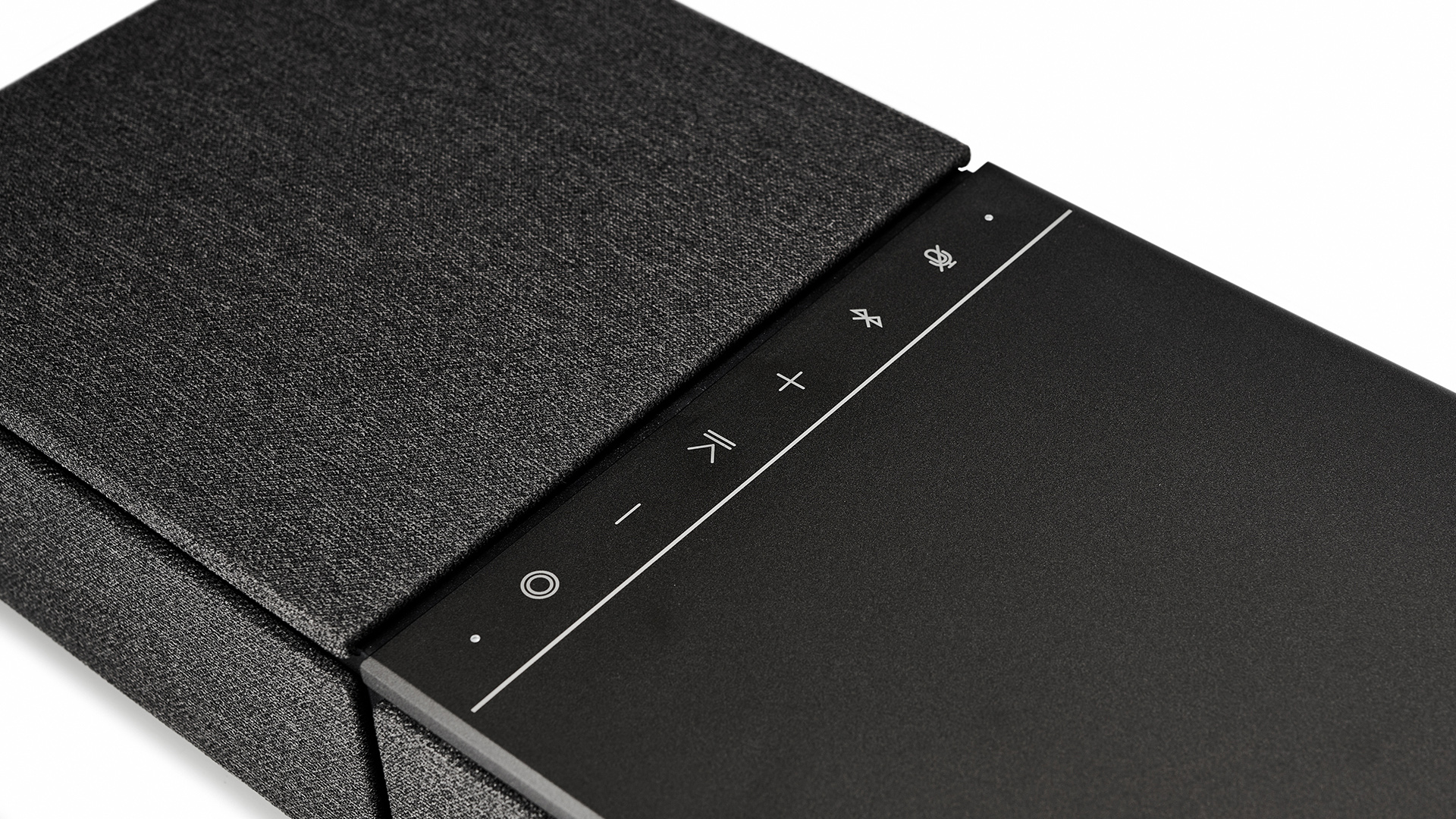
Devialet has positioned the Dione as a hi-fi soundbar aimed at audiophiles and, in some ways, it achieves this. It's certainly a refreshingly simple and elegant Dolby Atmos speaker without any added physical or sonic clutter, and it produces strikingly crisp and clean audio that impresses, particularly upon first-listen.
However, all soundbars make concessions due to their size. For the Dione, the trade-off is a less immersive soundfield, a restricted dynamic range and some occasional embellishment. At this price point, we think that the expansive sound and comprehensive feature set of the Ambeo will make it a better choice for most people, although it's also fair to say that Sennheiser's soundbar does have its own set of concessions.
SCORES
- Build 5
- Sound 4
- Features 4
MORE:
Read our review of the Sennheiser Ambeo
Also consider the Sony HT-A7000
Read our Sonos Arc review
These are the best soundbars: budget to premium
What Hi-Fi?, founded in 1976, is the world's leading independent guide to buying and owning hi-fi and home entertainment products. Our comprehensive tests help you buy the very best for your money, with our advice sections giving you step-by-step information on how to get even more from your music and movies. Everything is tested by our dedicated team of in-house reviewers in our custom-built test rooms in London, Reading and Bath. Our coveted five-star rating and Awards are recognised all over the world as the ultimate seal of approval, so you can buy with absolute confidence.

